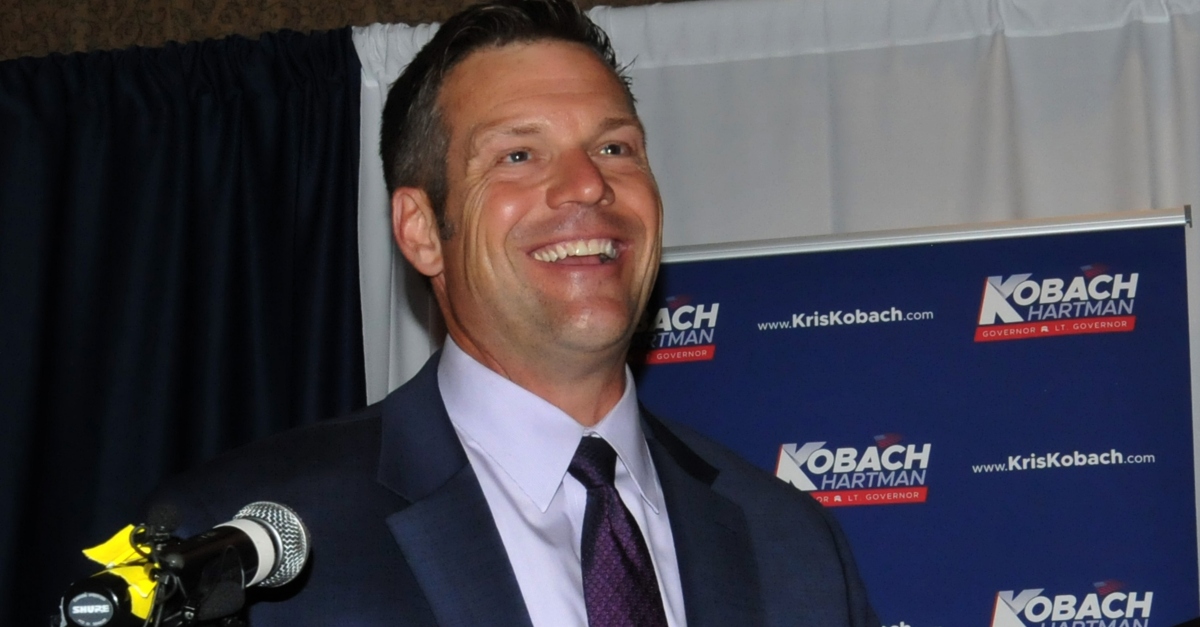
The House Oversight Committee published a memorandum on Friday pertaining to White House “interference” with the Committee’s interview of Kris Kobach, former Kansas Secretary of State and apparent “immigration czar” hopeful. The Committee said that it asked Kobach to answer questions about how a citizenship question came to be a priority for the 2020 Census and that he agreed to a voluntary interview — only to be stonewalled by the White House.
House Oversight sent a letter on April 29 asking Kobach to clear some things up about the origins of the citizenship question.
“The Committee sought to interview Mr. Kobach in part to help determine the actual reasons behind the Trump Administration’s decision to add the citizenship question,” the Friday memo said. “Commerce Secretary Wilbur Ross testified that he added the citizenship question ‘solely’ at the request of the Department of Justice (DOJ) to help enforce the Voting Rights Act.”
House Oversight rejected this testimony from Commerce Secretary Wilbur Ross.
“However, documents obtained by the Committee reveal that this was not the case. Instead, the record shows that Secretary Ross began a secret campaign to orchestrate the addition of the citizenship question just days after assuming his post and several months before any request from DOJ,” lawmakers continued. “Secretary Ross conducted this campaign despite warnings from his own experts at the Census Bureau that a citizenship question would harm the accuracy of the Census.”
Recall: In September 2018, U.S. District Judge Jesse Furman ruled that Ross had to submit to a deposition — because the case presents a sufficiently “exceptional circumstance” and because Ross’s “intent and credibility are directly at issue in these cases.” At the time, the judge said Ross alone could provide important information about how conversations with then-U.S. Attorney General Jeff Sessions and interested third parties like Kobach may have influenced the decision to include the immigration question.
The House Oversight Committee noted that Kobach has “admitted publicly that he proposed this idea to President [Donald] Trump ‘shortly after he was inaugurated’ and that the President ‘absolutely was interested.'”
The memo said that the White House learned of Kobach’s pending interview with House Oversight and sent a letter on May 21 directing Kobach “not to discuss the substance of any conversations he had with the President or senior White House advisers about official government matters, including ‘the addition of a citizenship question to the 2020 Census.'”
The Committee, which interviewed Kobach on June 3, said that the White House sent a letter that day reiterating that its directive “stands.” The White House cited executive privilege. House Oversight said that the White House “interfered directly and aggressively” with an interview of a private citizen, and that these demands “had their intended effect.”
“During the interview, Mr. Kobach declined more than 15 times to answer questions about his communications with the President and other White House officials, citing the directives from the White House,” the memo continued. “These instructions represent an aggressive new tactic by the White House to stop private citizens from answering questions posed by Congress. Taken to their logical end, these tactics could allow the White House to hide communications with lobbyists, special interest groups, and campaign donors.”
The Committee said this “expansion” of executive privilege was a “vast departure from previous precedent and obstructs the Committee’s constitutional responsibility to conduct oversight of the Census.”
Despite Kobach not answering a number of questions in keeping with the White House’s directives, lawmakers said he “did provide some new information.”
For example, he confirmed on the record certain elements of his conversations with the President and top White House aides. He also disclosed communications with the Trump campaign far earlier than previously known. However, he refused to answer questions about whether he had additional meetings with the President and his top aides other than those that have been previously disclosed. Finally, his description of his call with Secretary Ross appeared inconsistent with Secretary Ross’ testimony before the Committee in March.
Judge Furman previously blocked the addition of the citizenship question to the census, calling it “arbitrary and capricious.” The Supreme Court is going to resolve the issue.
Read the rest of the memo here.
[Image via Steve Pope/Getty Images]
Have a tip we should know? [email protected]